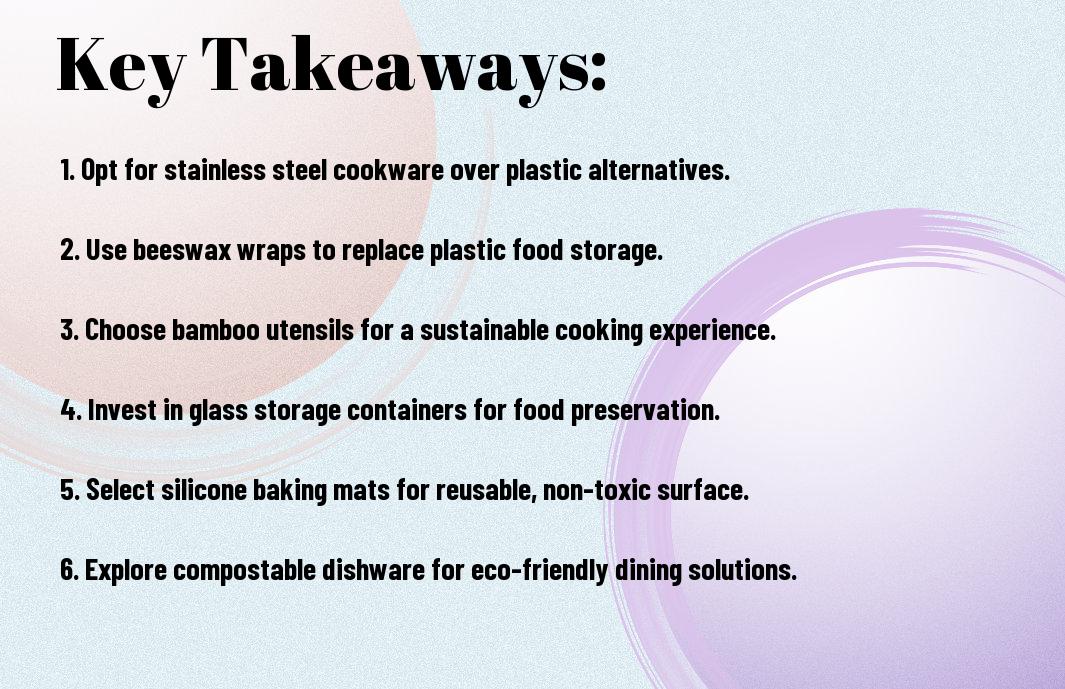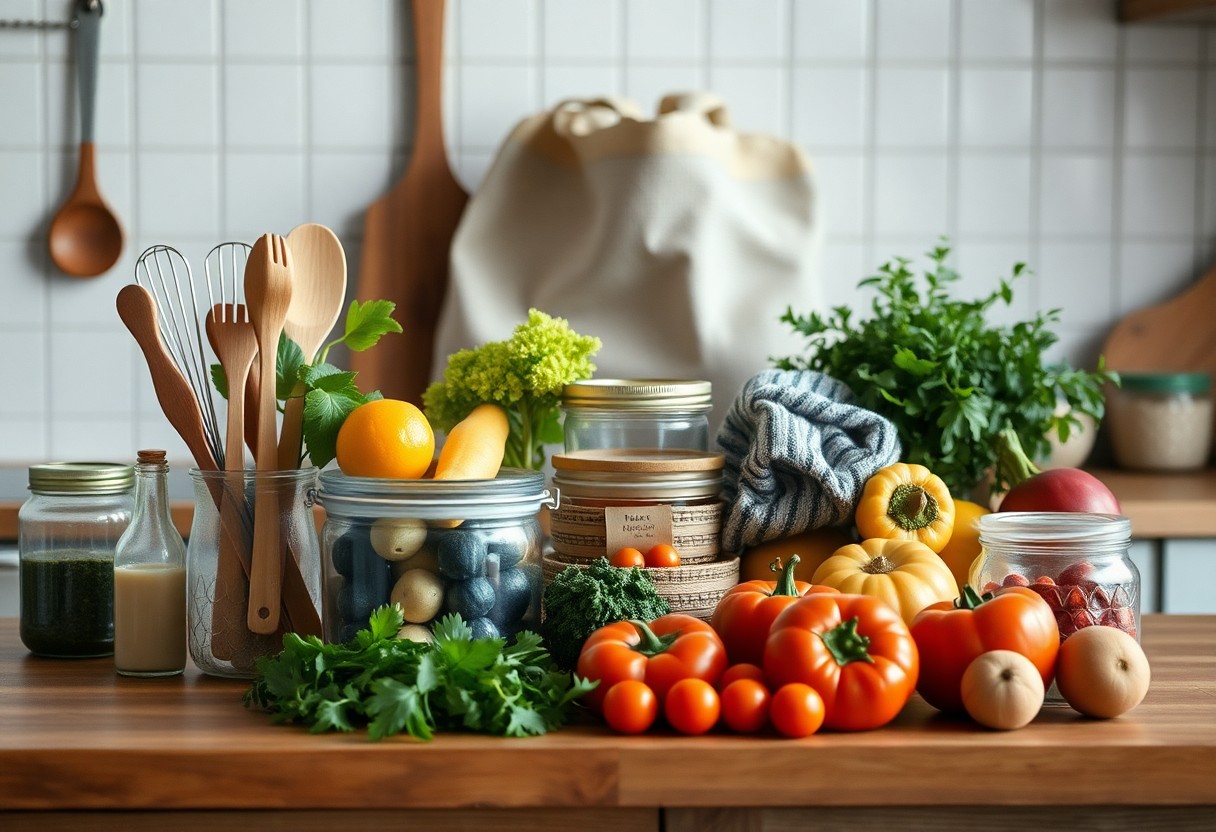As you strive to reduce your environmental footprint, your kitchen is a great place to start. You can make a significant impact by switching to eco-friendly products that eliminate plastic use. You’ll find numerous options available, from reusable utensils to sustainable cookware. By incorporating these green products into your cooking routine, you’ll not only be helping the planet, but also enhancing your cooking experience with durable and healthy alternatives.
Key Takeaways:
To reduce plastic use in cooking, consider the following key points:
- Use Reusable kitchen utensils and gadgets, such as silicone spoon rests and stainless steel spatulas, to minimize single-use plastic waste.
- Opt for Sustainable cookware, like cast iron or ceramic pans, which are durable and non-toxic, reducing the need for plastic-coated or non-stick pans.
- Choose Eco-Friendly food storage options, including glass containers and beeswax wraps, to store leftovers and keep food fresh without relying on plastic bags or wrap.
- Consider Compostable products, such as bamboo or plant-based cutting boards, which can reduce plastic waste and create nutrient-rich soil for gardens.
- Invest in Long-Lasting appliances, like slow cookers or instant pots, which can help reduce energy consumption and minimize the need for single-use plastic containers and utensils.
Benefits of Plastic-Free Cooking
The adoption of plastic-free cooking methods can have a significant impact on your daily life and the environment. By switching to eco-friendly products, you can reduce your carbon footprint and contribute to a more sustainable future.
Reducing Waste and Pollution
Benefits such as minimizing plastic waste and decreasing pollution are significant advantages of plastic-free cooking. You will be doing your part in reducing the amount of plastic that ends up in landfills and oceans.
Healthier Food Options
Cooking with plastic-free products allows you to avoid exposure to harmful chemicals and toxins. You can enjoy healthier and more flavorful meals, knowing that your food is prepared with safe and sustainable materials.
Pollution from plastic waste can contaminate your food and water, but by choosing plastic-free cooking options, you can minimize this risk. You can ensure that your meals are not only delicious but also safe for consumption, giving you peace of mind and a clear conscience about the impact of your cooking habits on your health and the environment.

Eco-Friendly Cookware
There’s a wide range of eco-friendly cookware options available, making it easy for you to switch to plastic-free cooking. You can choose from various materials, including stainless steel, cast iron, and ceramic, which are all durable and non-toxic.
Stainless Steel and Cast Iron Alternatives
Around these options, you’ll find that stainless steel and cast iron are popular choices for their heat conductivity and versatility, allowing you to cook a variety of dishes with ease, making your cooking experience more enjoyable and your kitchen more eco-friendly.
Non-Stick and Ceramic Options
Beside the traditional cookware options, non-stick and ceramic cookware are also great alternatives, offering you a healthier cooking experience with less oil and easy food release, making your meals not only delicious but also better for you.
Ironically, non-stick and ceramic options have come a long way, and you can now find many affordable and high-quality options that are also free from harmful chemicals, allowing you to cook with confidence and peace of mind, knowing that your cookware is safe for your health and the environment.
Green Kitchen Essentials
To create a plastic-free cooking space, you’ll want to invest in sustainable products that reduce waste and promote eco-friendly habits. You can start by replacing traditional kitchen items with green alternatives, allowing you to cook and store food in a more environmentally conscious way.
Reusable Bags and Containers
Beneath the surface of traditional kitchen storage, you’ll find a world of reusable options. You can switch to reusable bags and containers to store and transport your food, reducing your reliance on single-use plastics and keeping your kitchen organized.
Beeswax Wraps and Silicon Lids
For a more sustainable way to cover and store food, you can use beeswax wraps and silicon lids. You’ll find that these products are easy to use and clean, making them a great addition to your green kitchen.
Essentials like beeswax wraps and silicon lids will become staples in your kitchen, allowing you to cover bowls, wrap snacks, and store leftovers without using plastic wrap or aluminum foil. You’ll appreciate the versatility and effectiveness of these products as you work towards a plastic-free cooking routine.
Sustainable Food Storage
All your efforts to reduce plastic waste while cooking can be undone if you don’t store your food properly. You need to consider sustainable food storage options to maintain the quality of your food and the environment.
Glass Containers and Mason Jars
These glass containers are excellent alternatives to plastic containers, allowing you to store your food safely and healthily. You can use them to store leftovers, pack lunches, or preserve food, making them a great addition to your kitchen.
Compostable and Biodegradable Alternatives
Beside traditional storage methods, you can opt for compostable and biodegradable alternatives, such as beeswax wraps or plant-based containers, which can replace plastic wrap and containers. You can use them to store food, cover bowls, or wrap snacks, making them a convenient option.
With compostable and biodegradable alternatives, you can enjoy the benefits of sustainable food storage while minimizing your environmental impact. You can compost them at home, reducing your waste and creating nutrient-rich soil for your garden, making your cooking not only healthy but also eco-friendly.
Zero-Waste Cooking Tips
Keep your cooking habits eco-friendly with these simple tips:
- using reusable containers
- avoiding single-use plastics
. This approach will help you reduce your environmental footprint while cooking.
Meal Planning and Prep
Approximately, at the start of each week, you can plan your meals and make a grocery list to avoid buying unnecessary items and reduce waste.
Reducing Food Waste and Composting
The key to reducing waste is to be mindful of your food usage, you can start by composting food scraps and using them as fertilizer for your garden.
Waste reduction begins with you, by implementing simple changes in your daily cooking routine, such as using up leftovers and planning your meals, you can significantly reduce the amount of waste you generate, and composting will help you turn waste into a valuable resource for your garden, helping you to maintain a sustainable kitchen.

Innovative Green Products
Despite the abundance of eco-friendly options, you may still be unsure about what products to choose for plastic-free cooking. You can explore innovative solutions that make cooking more sustainable and efficient.
Bamboo and Wooden Utensils
Betwixt the various options, you’ll find bamboo and wooden utensils to be excellent alternatives to plastic. You can use them for cooking, serving, and eating, reducing your plastic usage significantly.
Plant-Based Cleaning Products
Producing less waste is easier with plant-based cleaning products. You can use them to clean your kitchen and cooking utensils, creating a healthier environment for your family.
Plus, when you opt for plant-based cleaning products, you’re not only reducing plastic waste but also avoiding harsh chemicals that can harm your health and the environment. You can explore various options, such as soap nuts, white vinegar, and lemon juice, to create effective cleaning solutions for your kitchen.
Conclusion
Conclusively, you now have the knowledge to make informed choices about the top green products for plastic-free cooking. You can transform your kitchen into an eco-friendly space by incorporating these products into your daily routine. Your decision to switch to plastic-free alternatives will significantly reduce your environmental footprint, and you will be contributing to a more sustainable future. By choosing these products, you are taking a significant step towards a healthier and more environmentally conscious lifestyle.
FAQ
Q: What are the benefits of using green products for plastic-free cooking?
A: Using green products for plastic-free cooking has numerous benefits, including reducing plastic waste, minimizing exposure to harmful chemicals, and promoting a healthier environment. By switching to eco-friendly alternatives, you can significantly decrease your carbon footprint and contribute to a more sustainable future. Some popular green products for plastic-free cooking include silicone baking mats, bamboo utensils, and stainless steel cookware. These products are durable, non-toxic, and can be used multiple times, making them an excellent replacement for traditional plastic-based cooking tools.
Q: What are some effective alternatives to traditional plastic wrap for food storage?
A: There are several effective alternatives to traditional plastic wrap for food storage, including beeswax wraps, glass containers, and silicone storage bags. Beeswax wraps are a natural, reusable, and biodegradable option that can be used to cover bowls, wrap snacks, and store leftovers. Glass containers are another excellent alternative, as they are non-toxic, dishwasher safe, and can be used for both storing and serving food. Silicone storage bags are also a great option, as they are flexible, airtight, and can be used to store a variety of foods, from snacks to leftovers.
Q: How can I make the transition to plastic-free cooking easier and more affordable?
A: Making the transition to plastic-free cooking can be easier and more affordable by starting with small changes and investing in multi-purpose products. Begin by replacing one or two plastic-based products with eco-friendly alternatives and gradually work your way up to a fully plastic-free kitchen. Consider purchasing products in bulk, shopping during sales, or looking for discounts online to make the transition more affordable. Additionally, many green products, such as silicone baking mats and stainless steel cookware, are designed to be durable and long-lasting, making them a worthwhile investment in the long run. By making these small changes, you can create a more sustainable and healthier cooking environment without breaking the bank.

